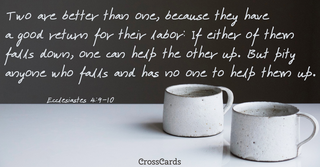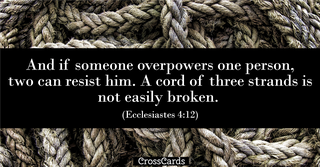
Change Translation
- Recent Translations
- All Translations
Images for Ecclesiastes 4:9-10


Share
Related Articles
Ecclesiastes 4:9-10 Meaning and Commentary
INTRODUCTION TO ECCLESIASTES 4
In this chapter the wise man reassumes the consideration of the case of the abuse of power, to show that there is no happiness in this world, in grandeur and authority enjoyed; since, as he had observed before, on the one hand, the oppressor shall be judged and condemned at the great day of account; so, on the other hand, the oppressed have their lives made so uncomfortable, that the dead are preferred unto them, and unborn persons to them both, Ec 4:1-3; Another vanity he observes, that whereas men expect to be happy by their diligence and industry, this brings upon them the envy of others, Ec 4:4; hence some, on the other hand, place their happiness in sloth and ease, which is another vanity, Ec 4:5,6; and others again in covetousness; who are described by their unsocial life, toilsome labour, unsatisfied desires, and withholding good things from themselves, Ec 4:7,8; upon which some things are said, to show the benefits of a social life, Ec 4:9-12. And the chapter is concluded with exposing the vanity of the highest instance of worldly power and grandeur, royal dignity, through the folly of a king; the effects of which are mentioned, Ec 4:13,14; and through the fickleness of the people, who are soon weary of a prince on the throne, and court his successor, Ec 4:15,16.
Study Tools
PLUSUnlock Notes
This feature is for PLUS subscribers only. Join PLUS today to access these tools and more.
JOIN PLUSUnlock Highlights
This feature is for PLUS subscribers only. Join PLUS today to access these tools and more.
JOIN PLUSUnlock Bookmarks
This feature is for PLUS subscribers only. Join PLUS today to access these tools and more.
JOIN PLUSTrack Your Reading
Create a free account to start a reading plan, or join PLUS to unlock our full suite of premium study tools.
